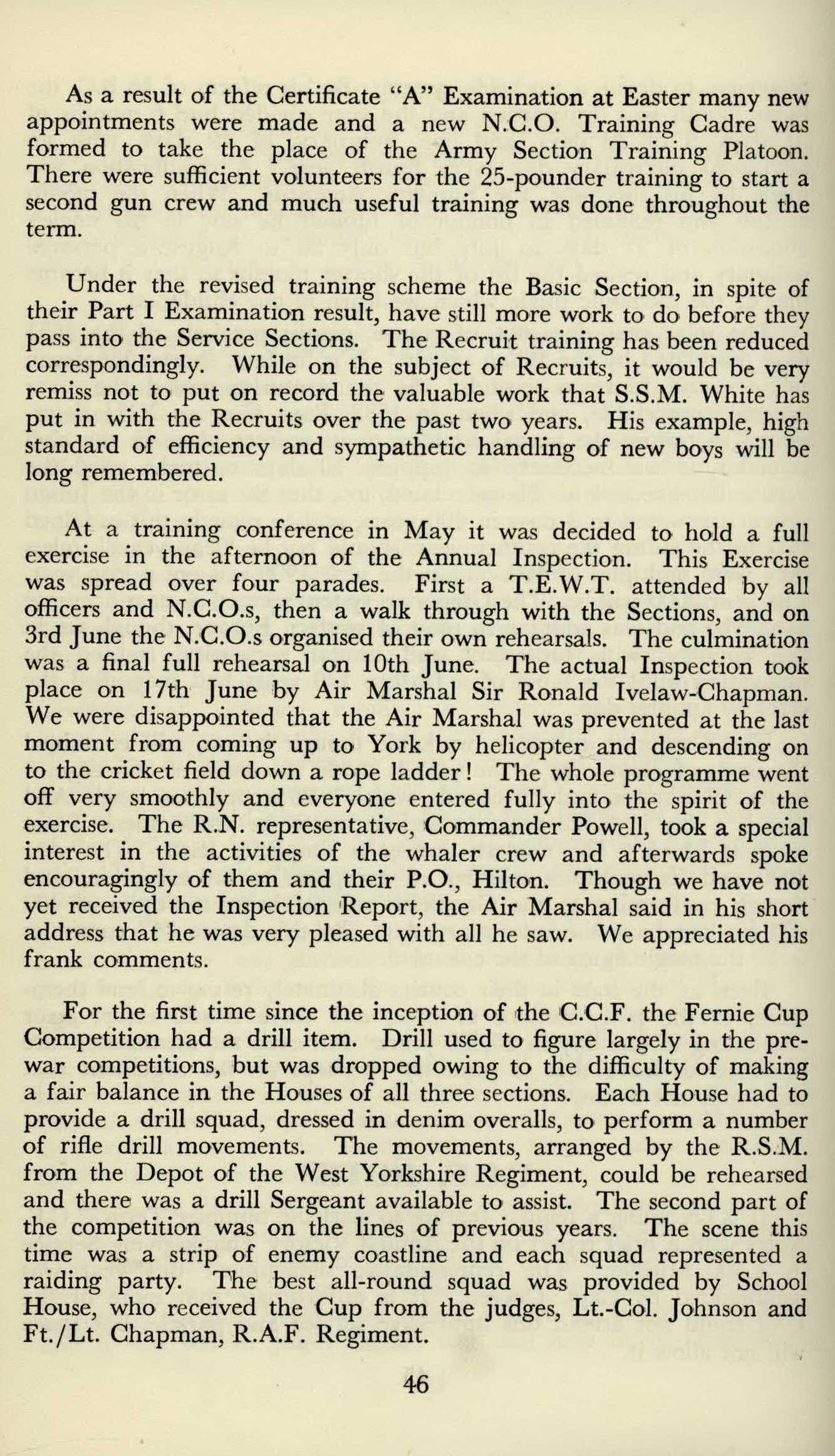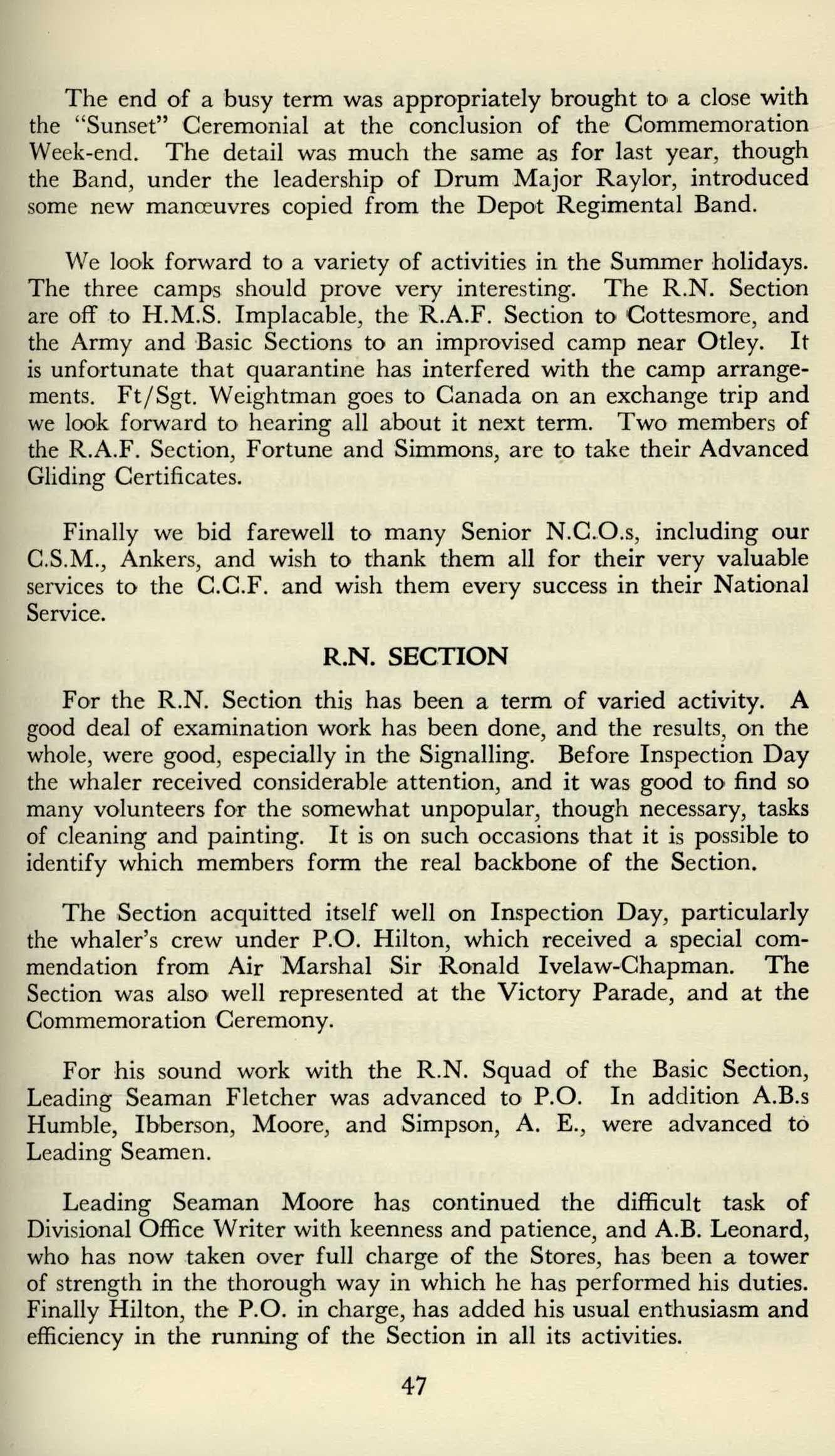
6 minute read
C.C.F. Notes
from Oct 1952
by StPetersYork
Sosigenes, to devise a workable system. By his reform of 46 B.C. the lunar month was disregarded and the year divided into 6 months of 31 days, 5 of 30 days, and one, February, of 29 days, with an additional intercalary day every fourth year. A modification was made by his successor, the Emperor Augustus. When the month Sextilis was renamed in honour of himself he saw in his uncle's allocation of 31 days to July but only 30 to August a personal indignity and revised the list of the shorter months so that it became that of the memonic jingle which we learn in our childhood.
The solar year does not, of course, consist precisely of the 365* days postulated by the Julian system. It is, in fact, shorter by eleven minutes and fourteen seconds. As the centuries passed the error became appreciable, and when, in 1582, Pope Gregory XIII determined to restore the vernal equinox to its correct place in the civil calendar, it was necessary to suppress 10 days to make good the accumulated recession. He calculated, too, that the error in the Julian system amounted to 3 days in 400 years, and to remedy this ordained that in the future the century years should not be "leap years" unless they were multiples of 400. Thus the year 1900 was not a leap year. The year 2000 will be. The Gregorian system seemed as near accurate as maybe and was adopted in most of western Europe, though we in this country, with protestant and insular perversity, resisted the innovation until the lapse of a further 170 years had magnified the error by another day.
The Gregorian calendar, workable though it was, still contained the seeds of error. By it the year is made to consist of 365 days, 5 hours, 49 minutes, and 12 seconds, which is 26 seconds too long. And that is a day in 3,323 years—a serious matter to astronomers, if not to most of us. The modern answer is simplicity itself. The year 4000 and its multiples will be an exception to an exception, and though conforming to the Gregorian rule of being multiples of 400 will yet not have the intercalary day. By this device "4" continues to be the magic figure of the calendar.
Even so, the stars in their courses obstinately refuse to lend themselves to the petty notions of men, and there is still error; error amounting to one day in 20,000 years. But even the astronomers are prepared to leave that to posterity—perhaps on the argument that there may not be any. L.B,
It is becoming a regular feature to start the Summer Term C.C.F. Notes with a brief report on the Annual Victory Thanksgiving Service in York Minster. The representative detachment this year was commanded by Capt. Craven. It is unfortunate that more of the Unit could not attend this impressive service and parade, but space will not allow it.
As a result of the Certificate "A" Examination at Easter many new appointments were made and a new N.C.O. Training Cadre was formed to take the place of the Army Section Training Platoon. There were sufficient volunteers for the 25-pounder training to start a second gun crew and much useful training was done throughout the term.
Under the revised training scheme the Basic Section, in spite of their Part I Examination result, have still more work to do before they pass into the Service Sections. The Recruit training has been reduced correspondingly. While on the subject of Recruits, it would be very remiss not to put on record the valuable work that S.S.M. White has put in with the Recruits over the past two years. His example, high standard of efficiency and sympathetic handling of new boys will be long remembered.
At a training conference in May it was decided to hold a full exercise in the afternoon of the Annual Inspection. This Exercise was spread over four parades. First a T.E.W.T. attended by all officers and N.C.O.s, then a walk through with the Sections, and on 3rd June the N.C.O.s organised their own rehearsals. The culmination was a final full rehearsal on 10th June. The actual Inspection took place on 17th June by Air Marshal Sir Ronald Ivelaw-Chapman. We were disappointed that the Air Marshal was prevented at the last moment from coming up to York by helicopter and descending on to the cricket field down a rope ladder ! The whole programme went off very smoothly and everyone entered fully into the spirit of the exercise. The R.N. representative, Commander Powell, took a special interest in the activities of the whaler crew and afterwards spoke encouragingly of them and their P.O., Hilton. Though we have not yet received the Inspection Report, the Air Marshal said in his short address that he was very pleased with all he saw. We appreciated his frank comments.

For the first time since the inception of the C.C.F. the Fernie Cup Competition had a drill item. Drill used to figure largely in the prewar competitions, but was dropped owing to the difficulty of making a fair balance in the Houses of all three sections. Each House had to provide a drill squad, dressed in denim overalls, to perform a number of rifle drill movements. The movements, arranged by the R.S.M. from the Depot of the West Yorkshire Regiment, could be rehearsed and there was a drill Sergeant available to assist. The second part of the competition was on the lines of previous years. The scene this time was a strip of enemy coastline and each squad represented a raiding party. The best all-round squad was provided by School House, who received the Cup from the judges, Lt.-Col. Johnson and Ft./Lt. Chapman, R.A.F. Regiment.
The end of a busy term was appropriately brought to a close with the "Sunset" Ceremonial at the conclusion of the Commemoration Week-end. The detail was much the same as for last year, though the Band, under the leadership of Drum Major Raylor, introduced some new manoeuvres copied from the Depot Regimental Band.
We look forward to a variety of activities in the Summer holidays. The three camps should prove very interesting. The R.N. Section are off to H.M.S. Implacable, the R.A.F. Section to Cottesmore, and the Army and Basic Sections to an improvised camp near Otley. It is unfortunate that quarantine has interfered with the camp arrangements. Ft/Sgt. Weightman goes to Canada on an exchange trip and we look forward to hearing all about it next term. Two members of the R.A.F. Section, Fortune and Simmons, are to take their Advanced Gliding Certificates.
Finally we bid farewell to many Senior N.C.O.s, including our C.S.M., Ankers, and wish to thank them all for their very valuable services to the C.C.F. and wish them every success in their National Service.
R.N. SECTION
For the R.N. Section this has been a term of varied activity. A good deal of examination work has been done, and the results, on the whole, were good, especially in the Signalling. Before Inspection Day the whaler received considerable attention, and it was good to find so many volunteers for the somewhat unpopular, though necessary, tasks of cleaning and painting. It is on such occasions that it is possible to identify which members form the real backbone of the Section.

The Section acquitted itself well on Inspection Day, particularly the whaler's crew under P.O. Hilton, which received a special commendation from Air 'Marshal Sir Ronald Ivelaw-Chapman. The Section was also well represented at the Victory Parade, and at the Commemoration Ceremony.
For his sound work with the R.N. Squad of the Basic Section, Leading Seaman Fletcher was advanced to P.O. In addition A.B.s Humble, Ibberson, Moore, and Simpson, A. E., were advanced to Leading Seamen.
Leading Seaman Moore has continued the difficult task of Divisional Office Writer with keenness and patience, and A.B. Leonard, who has now taken over full charge of the Stores, has 'been a tower of strength in the thorough way in which he has performed his duties. Finally Hilton, the P.O. in charge, has added his usual enthusiasm and efficiency in the running of the Section in all its activities.










